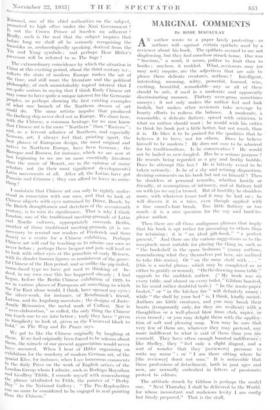MARGINAL COMMENTS
/Ty ROSE MACAULAY
AN author wrote to a paper lately protesting--as authors will—against certain epithets used by a reviewer about his book. The epithets seemed to me not displeasing, but they had somehow struck home. One was " luscious," a word, it seems, politer to fruit than to books ; anyhow, it rankled. What, reviewers may (or may not) enquire, are the adjectives that are safe to please those delicate creatures, authors ? Intelligent, interesting, amusing, witty, powerful, learned, wise, exciting, beautiful, remarkable—any or all of these should be safe, if used in a moderate and apparently discriminating naanner. Flattery* over-gross 'sometimes annoys ; it not only makes the author feel and look foolish, but makes other reviewers take revenge by hearty efforts to redress the balance. A Moderate, a reasonable, a delicate flattery, spiced with criticism, is what an author should 'want ; he would wish his critics to think his book just a little better, but not much, than it is. He likes it to be praised for the qualities that he ' believes it to have, not for others. Does he believe himself to be modern ? He does not care to be 'admired for his traditionalism. Is he conservative ? He would not be hailed as new-fangled. Has he a serious 'purpose ? He resents being regarded as a gay and frothy bubble. Does he attempt this last ? He is bitterly vexed to be taken seriously., :Is he of a shy. and retiring disposition, desiring comments on his book but not on himself ? Then he shudders at personal remarks, whether hostile or friendly, at assumptions of intimacy, and at flattery laid on with (as we say) a trowel. But at hostility he shudders more, with whatever lesser tool it may be laid on ; he will discern it in a trice, even though applied with a fine camel's-hair brush. Too little flattery or too much—it is a nice question for the coy and hard-td- please author. '
Then there arc all those ambiguous phrases that imply that his book is apt rather for presenting to others than for retaining : it is " an ideal gift-book," " a perfect present." And there are the various suggestions as to the receptacle most suitable for placing the thing in, such as " the bookshelf in the spare bedroom " (many authors, remembering what they themselves put here, arc inclined to take this amiss). Or " on the same shelf with . .. " (this is a useful phrase, which may be completed so as either to gratify or Wound ). "On the drawing-room, table,•7 appeals to the snobbish author. • (" My book was on every table, and alMoSt on every toilet," Gibbon boaSted, in his usual rather the taste.) " In the waste-paper basket," or " in the kitchen fire " will definitely' annoy; while " the shelf by yOur bed " is, I. think, kindly meant. Authors are kittle creatures, and you may break their hearts (temporarily only, for they are resilient) With :a thoughtless or a well-placed blow from club, rapier. Or even trowel ; or you may delight than with the applic:a- tiOn of. soft and pleasing soap. You may be sure I Imt very few of them are, whatever they may pretend, any more indifferent to what is said of them than you tie yourself. They ha ve often enough boasted indifference ; like Shelley, they " feel only a slight disgust, and a sort of wonder that they' [reviewers] presume to write my name ". ; Or. " I am there sitting where he [the reviewer] durst not soar." It is noticeable that these professions of detachment, both in past , ages and now, are normally embodied in letters of passionate protest to editors.
The attitude struck by Gibbon is perhaps the model one. " Next Thursday I shall be delivered to the World, for whose inconstant. and malicious levity I: am coolly • but firmly prepared." That is the stuff,






























































































 Previous page
Previous page